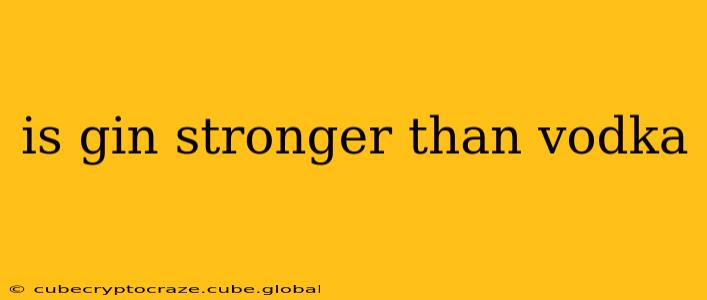Is Gin Stronger Than Vodka? Unpacking the Alcohol Content
The question of whether gin is stronger than vodka is a common one, and the answer isn't a simple yes or no. The truth is, it depends. Both gin and vodka are distilled spirits, and their alcohol content (ABV – alcohol by volume) can vary significantly depending on the brand and type.
Generally, both gin and vodka are produced to have an ABV around 40%, which is roughly 80 proof. However, you'll find variations. Some vodkas might be bottled at 35% ABV, while some gins might reach 47% ABV or even higher. Therefore, comparing the strength solely based on the spirit type is inaccurate. Always check the label for the specific ABV of the bottle in question.
What Determines the Alcohol Content of Gin and Vodka?
Several factors influence the final ABV of gin and vodka:
- The distillation process: The number of times the liquid is distilled directly affects the concentration of alcohol. More distillations generally result in a higher ABV.
- The base ingredient: The type of grain or other base ingredient used during fermentation can also slightly affect the final alcohol content.
- The producer's recipe: Producers may intentionally choose to adjust the ABV during the bottling process to meet a specific target or brand identity.
Why is there confusion about the relative strength?
The perception that one might be stronger than the other often stems from the added botanicals in gin. While these botanicals don't change the alcohol percentage, they can create a more pronounced taste and sensation in the mouth, leading some to feel that gin is stronger or has a more intense effect. This is a subjective experience and not an objective measure of alcohol content.
Does Gin's Flavor Profile Affect Its Perceived Strength?
Yes, the additional botanicals infused into gin can impact the drinking experience. These botanicals, such as juniper berries, coriander, and citrus peels, contribute to a complex flavor profile. This complex flavor profile can sometimes lead to a more pronounced and lingering sensation in the mouth, making it seem stronger than vodka, which generally has a cleaner, neutral taste. However, this is purely subjective; the ABV remains the true indicator of strength.
What about different types of gin and vodka?
The ABV can vary even within the categories of gin and vodka. For example, some craft gins might have higher ABV than mass-produced vodkas, while some premium vodkas may be bottled at a higher percentage than standard gins. Therefore, relying solely on the type of liquor to determine the strength is unreliable.
How can I find out the alcohol content of a specific bottle?
Always check the label. The ABV is clearly stated on the bottle, usually as a percentage (e.g., 40% ABV) or as proof (e.g., 80 proof). Remember, proof is double the percentage of ABV.
In conclusion, while both gin and vodka typically hover around 40% ABV, there's no consistent rule stating one is definitively stronger than the other. Always refer to the bottle's label for accurate alcohol content information. The perceived strength can be influenced by subjective factors like flavor profile, but the ABV remains the objective measure of strength.
